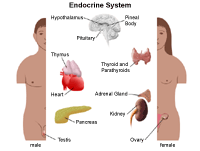Anatomy of the Endocrine System
The endocrine system is a complex network of glands and organs. It uses hormones to control and coordinate your body's metabolism, energy level, reproduction, growth and development, and response to injury, stress, and mood. The following are integral parts of the endocrine system:
Hypothalamus. The hypothalamus is located at the base of the brain, near the optic chiasm where the optic nerves behind each eye cross and meet. The hypothalamus secretes hormones that stimulate or suppress the release of hormones in the pituitary gland, in addition to controlling water balance, sleep, temperature, appetite, and blood pressure.
Pineal body. The pineal body is located below the corpus callosum, in the middle of the brain. It produces the hormone melatonin, which helps the body know when it's time to sleep.
Pituitary. The pituitary gland is located below the brain. Usually no larger than a pea, the gland controls many functions of the other endocrine glands.
Thyroid and parathyroid. The thyroid gland and parathyroid glands are located in front of the neck, below the larynx (voice box). The thyroid plays an important role in the body's metabolism. The parathyroid glands play an important role in the regulation of the body's calcium balance.
Thymus. The thymus is located in the upper part of the chest and produces white blood cells that fight infections and destroy abnormal cells.
Adrenal gland. An adrenal gland is located on top of each kidney. Like many glands, the adrenal glands work hand-in-hand with the hypothalamus and pituitary gland. The adrenal glands make and release corticosteroid hormones and epinephrine that maintain blood pressure and regulate metabolism.
Pancreas. The pancreas is located across the back of the abdomen, behind the stomach. The pancreas plays a role in digestion, as well as hormone production. Hormones produced by the pancreas include insulin and glucagon, which regulate levels of blood sugar.
Ovary. A woman's ovaries are located on both sides of the uterus, below the opening of the fallopian tubes (tubes that extend from the uterus to the ovaries). In addition to containing the egg cells necessary for reproduction, the ovaries also produce estrogen and progesterone.
Testis. A man's testes are located in a pouch that hangs suspended outside the male body. The testes produce testosterone and sperm.






